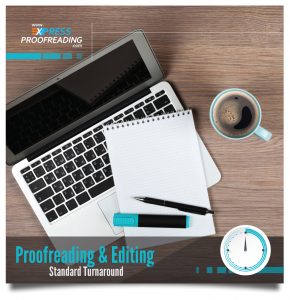How to Become a Freelance Proofreader UK
If you have a passion for language and an eye for detail, then becoming a freelance proofreader in the UK might be the perfect career for you. Freelance proofreaders work with a variety of clients, including businesses, publishers, authors, and students, to ensure that their written work is error-free and polished. In this article, we will explore how to become a freelance proofreader in the UK, from developing your skills to building your business.
Develop Your Skills
Before you can become a freelance proofreader, you need to have strong language skills. This means having a good grasp of grammar, spelling, and punctuation. If you are unsure about your skills, then there are plenty of resources available to help you improve.
The first step is to brush up on your basic language skills. This can be done by taking online courses, such as the PTC Basic Proofreading course, which will give you the skills and knowledge you need to start your career. There are also many books on proofreading, such as "The Handbook of Good English" by Edward D. Johnson, that can help you to improve your language skills.
Once you have a solid understanding of language, it's important to practice proofreading. You can do this by proofreading your own writing or by asking friends and family to send you their writing to proofread. This will help you to develop your eye for detail and your ability to spot errors.
Build Your Portfolio
Once you have developed your skills, it's time to start building your portfolio. A portfolio is a collection of your best work that demonstrates your skills as a proofreader. You can do this by offering your proofreading services to friends and family, or by volunteering to proofread for local charities or community groups. This will give you valuable experience and help you to build your reputation as a proofreader.
You can also build your portfolio by taking on small projects from online freelance platforms, such as Upwork or Fiverr. These platforms allow you to showcase your skills to a global audience and build your portfolio at the same time. When taking on projects, it's important to choose ones that are in your niche and that you are confident you can complete to a high standard.
Find Your Niche
There are many different types of proofreading, and it's important to find your niche. Some proofreaders specialise in academic proofreading, while others focus on fiction or non-fiction. It's important to choose a niche that you are passionate about and have experience in. This will help you to market yourself as an expert in your field and attract clients who are looking for your specific skills.
To find your niche, think about your interests and experience. For example, if you have a background in law, you could specialise in proofreading legal documents. If you have a passion for fiction, you could specialise in proofreading novels. By choosing a niche, you can differentiate yourself from other proofreaders and attract clients who are looking for your specific skills.
Create a Professional Website
In today's digital age, having a professional website is essential. Your website should showcase your skills and experience, as well as provide information about your services and rates. It's important to make your website easy to navigate and visually appealing.
When creating your website, consider the following:
- Domain Name: Choose a domain name that is easy to remember and reflects your business.
- Hosting: Choose a reliable hosting provider that can support your website.
- Design: Choose a design that is visually appealing and easy to navigate.
- Content: Write content that showcases your skills and experience, and provides information about your services and rates.
- Contact Information: Make it easy for clients to contact you by providing your email address or a contact form.
Market Yourself
Once you have your website and portfolio in place, it's time to start marketing yourself. There are many ways to do this, including:
- Social Media: Use social media platforms such as LinkedIn, Twitter, and Facebook to promote your services and connect with potential clients.
- Networking: Attend industry events and conferences to meet other professionals in your field and build your network.
- Advertising: Consider placing ads in industry publications or online directories to attract clients.
- Referrals: Encourage your satisfied clients to refer you to their friends and colleagues.
Set Your Rates
One of the most important decisions you will make as a freelance proofreader is setting your rates. It's important to research the market and find out what other proofreaders are charging. You should also take into account your level of experience, your niche, and the complexity of the work. You may want to start with lower rates when you are first starting out to build your portfolio and reputation, but it's important to make sure that your rates are sustainable in the long term.
Manage Your Finances
As a freelance proofreader, you will be responsible for managing your finances. This includes invoicing clients, tracking your income and expenses, and paying taxes. It's important to keep accurate records and set aside money for taxes. You may want to consider using accounting software such as QuickBooks or Xero to help you manage your finances.
Continuously Improve Your Skills
Finally, it's important to continuously improve your skills as a proofreader. This means staying up to date with changes in language and grammar, as well as developing your knowledge in your chosen niche. You can do this by attending industry events and conferences, taking courses, and reading industry publications.
To Conclude
In conclusion, becoming an English proofreader can be a rewarding career choice for those with a passion for language and an eye for detail. While there are no specific educational requirements for becoming a proofreader, it is important to have a strong grasp of the English language and a passions for proofreading.
How Much Does Proofreading a PhD Thesis Cost
The cost of proofreading a PhD thesis can vary depending on several factors, including the length of the document, the level of editing required, and the turnaround time.
Proofreading a PhD Thesis Prices
In general, the cost of proofreading a PhD thesis can range from a few hundred Pounds to several thousand Pounds. Many professional proofreading services charge by the word, with rates ranging from £0.01 to £0.04 per word. For a typical PhD thesis of 80,000-100,000 words, this could translate to a cost of £800-£4,000.
However, it is important to note that the cost of proofreading can vary depending on the level of editing required. Proofreading involves correcting errors in grammar, spelling, punctuation, and formatting. If the document requires more extensive editing, such as restructuring sentences or improving the flow of the writing, the cost may be higher.
The Turnaround Time
The turnaround time for proofreading can also affect the cost. If you need the document proofread quickly, the cost may be higher than if you can wait for a longer turnaround time.
It is important to choose a reputable proofreading service that employs experienced and qualified proofreaders. Some proofreading services may offer lower rates, but may not provide the same level of quality and attention to detail as more reputable proofreading services.
In addition to professional proofreading services, some universities and academic departments may offer proofreading services to their students for a reduced cost or for free. It is worth checking with your university or department to see if such services are available. However, this may not be as detailed as using a professional company.
Overall, the cost of proofreading a PhD thesis can be a significant expense, but it is an important investment in ensuring the quality and clarity of your PhD thesis. It is important to consider the level of editing required, the turnaround time, and the reputation and qualifications of the proofreading service when determining the cost.
Our Proofreading Prices
At Express Proofreading we receive many enquires and orders from students and academics wishing to have their PhD thesis proofread. Our prices for our proofreading and editing service are amongst the most competitive on the market and start from £11 per 1,000 words. However, for documents greater than 50,000 words we are able to offer a discount and reduce this price to £10 per 1,000 words, we believe this to be amongst the most competitive prices for such a service.
Instant Quote for our PhD Proofreading
Placing an order with us is easy, simply click the Instant Quote button. Upload your PhD, then our Quote Generator will calculate an individual quote for you, based upon the word count of your document. Once you are happy with your proofreading quote, you can then click Place Order and proceed to our secure checkout page
If you wish to find out more information about our academic proofreading services, please visit the academic proofreading page. Alternatively, feel free to contact us and our team will be more than happy to help with any questions.
How to Become an English Proofreader
Becoming an English proofreader is a great career option for those who have a passion for language and an eye for detail. Proofreaders are responsible for ensuring that written content is free of errors in grammar, spelling, punctuation, and formatting. In this article, we will discuss the different qualifications and routes to becoming an English proofreader, how to get work as a proofreader, and the different employment options available.
Qualifications and Routes
There are no specific educational requirements for becoming an English proofreader, but having a strong grasp of the English language is essential. Most employers will require proofreaders to have a degree in English, journalism, or a related field, but it is possible to become a proofreader without a degree by gaining experience and building a strong portfolio of work.
One way to gain experience as a proofreader is to start by volunteering to proofread for friends, family, or local organizations. This will help you develop your skills and build a portfolio of work that you can show to potential employers.
Another way to gain experience is to take courses or workshops in proofreading. Many universities, colleges, and professional organizations offer courses in proofreading, copyediting, and other related skills. These courses can provide valuable training and certification that can help you stand out in the job market.
In addition to formal training, it is also important to keep up with current trends and developments in the field. Joining professional organizations, attending conferences, and reading industry publications can all help you stay up-to-date and connected with other professionals in the field.
How to Get Work as a Proofreader
Once you have the necessary qualifications and experience, the next step is to find work as a proofreader. There are several ways to find proofreading work, including:
- Freelancing: Many proofreaders work as freelancers, offering their services to clients on a project-by-project basis. Freelancing can be a great way to gain experience and build a portfolio of work, but it also requires self-motivation, organization, and the ability to market yourself effectively.
- Staff positions: Some companies hire in-house proofreaders to work on a full-time or part-time basis. These positions may be advertised on job boards or on the company's website.
- Contract work: Some companies hire proofreaders on a contract basis to work on specific projects. Contract work can be a good way to gain experience and build your network of clients.
- Online platforms: There are several online platforms that connect freelance proofreaders with clients, including Upwork, Fiverr, and Freelancer. These platforms allow you to create a profile, set your rates, and bid on projects.
Employment Options
There are several employment options available for English proofreaders, including:
- Publishing: Many proofreaders work in the publishing industry, proofreading books, magazines, and other printed materials. Publishers may hire proofreaders on a freelance or staff basis.
- Marketing and advertising: Proofreaders are often needed in the marketing and advertising industries to ensure that written materials, such as advertisements and brochures, are free of errors.
- Education: Proofreaders are also needed in the education industry to proofread textbooks, study guides, and other educational materials.
- Government: Some government agencies hire proofreaders to proofread reports, memos, and other official documents.
- Freelancing: As mentioned earlier, many proofreaders work as freelancers, offering their services to clients in a variety of industries.
Conclusion
Becoming an English proofreader can be a rewarding career choice for those with a passion for language and an eye for detail. While there are no specific educational requirements for becoming a proofreader, it is important to have a strong grasp of the English language and a passions for proofreading.
Express Proofreading London
Proofreading London
Express Proofreading London is a leading proofreading and editing service. We provide professional proofreading services for students and businesses. Our academic London proofreaders are able to proofread a wide range of 

Academic Proofreading Services
Express Proofreading London is a specialist proofreading service, our London proofreaders specialise in academic proofreading and editing services for students. We cover all academic disciplines and match your work to an editor with the relevant background and experience in your field. For more information, please visit our Academic Proofreading page. Alternatively, to obtain an instant quote, visit our Instant Quote page.
Business Proofreading Services
As well as academic proofreading our London proofreaders also provide a comprehensive, professional business proofreading service. Our proofreading services can help businesses in London and around the UK from various sectors and industries, from small businesses, governmental departments, Universities, banking and financial institutions to novelists. Once your order is placed, your document is assigned to one of our London proofreaders with the most relevant background and experience in your industry. For more information, please visit our Business Proofreading page. Alternatively, to obtain an instant quote, visit our Instant Quote page.
Our Application Proofreading
At Express Proofreading London, we also offer a comprehensive application review and proofreading service to ensure your application stands out from the crowd. Having a compelling and engaging application, whether it is a personal statement for University admissions or a CV can be the key to a successful application.
For more information about our Application Review services and how to place an order, please visit the Application Review page, or contact a member of our team.
Qualified & Experienced London Proofreaders
Our UK proofreading service is of the highest quality, all of our London proofreaders and editors have the highest level of expertise. As a minimum, we ensure that all of our editors hold Masters/PhD qualifications, from leading British universities, and have extensive experience in proofreading.

Our Company
Our company was established with the primary aim of providing a professional, reliable and streamlined proofreading service to students, academics and to businesses in London and around the UK. Our comprehensive and professional London proofreading service means that we can offer a wide variety of services and offer our services at varying turnaround times to meet your needs. Over the years, we have built a reputation for providing a high quality service, just have a look at some of our positive reviews on Google and Free Index and see for yourself.
Instant Quote and Easy Secure Order Process
Placing an order with us is easy, simply click the Instant Quote button below. Upload your document then our Quote Generator will calculate an individual quote for you, based upon the word count of your document. Once you are happy with your proofreading quote, you can then click Place Order and proceed to our secure checkout page
9 Essential Proofreading Techniques for Business Documents
Proofreading Techniques for Business Communications


In this article we set out 9 useful proofreading techniques designed to help businesses when proofreading business communication.
Proofreading Technique 1 – Make a Checklist
Often when proofreading in-house, it is easy to assume that proofreading is a quick process and just involves glancing over the document. It is however much more than this. That’s why the first thing to do is to make an in-house checklist based upon your organisations style guide. In this you can include and detail what to look out for to maintain consistency.
Proofreading Technique 2 – Print a Hard Copy
Printing a physical copy can really help pick up on things you wouldn’t have noticed. Often by staring at the screen we get used to seeing the text as it is and we fail to notice obvious issues. By having a printed copy in front of you this will also make it easier for you to read and proofread the document in different places. Also consider changing the font or size of the text. This change in format helps you to see the work in a different way and identify errors that you may have missed.
Proofreading Technique 3 – Step Away & Focus
By taking a break and stepping away from the document, this will help you to regain focus and take your mind off the document. If you have written the document then you will already be familiar with the text and so you will automatically overlook errors as you will be used to the text as it is. By taking a break and stepping away this will help to clear your mind and make it easier when you begin to proofread the document.
Proofreading Technique 4 – Read Aloud
By reading aloud and trying to pronounce the words this will make you more effective at spotting potential flaws. This is because the sound of your own voice will help you to focus on the words and notice any errors. It will also help you to better focus on whether the points and sentences are logical, as often when we hear words and phrases aloud they can sound different to how we imagined.
Proofreading Technique 5 – Remove Unnecessary Words
Business documents will often need to be concise, for this reason try to make the sentences direct by taking away any unnecessary words. By having extra words this can detract and also undermine the meaning and open the text to misinterpretation. By being concise this will also give the text a more professional tone.
Proofreading Technique 6 – Keep a List of Common Errors
Keeping a list of common errors can help you to identify the types of mistakes that are particularly common and help avoid them in the future. This will also make you more vigilant in spotting those types of errors when proofreading.
Proofreading Technique 7 – Look out for Homonyms
One of the more important proofreading techniques is to look out for homonyms. This is a particularly common mistake, homonyms are words that share the spelling or pronunciation but have different meanings. For example ‘compliment’ and ‘complement’. These can be particularly easy to overlook but by being aware of them will help you to spot them.
Proofreading Technique 8 – Look out for Apostrophes and Contractions
It is an easy mistake to incorrectly use apostrophes or confuse the use of contractions, so you should pay particular attention to these. Often it is helpful to make a list of the commonly confused contractions so you can avoid them in the future. For example, “there” is a noun telling you of a point or place. “They’re” is simply a contraction for “they are.” Also “it’s” is simply a contraction for “it is.” Whereas, “its” is a possessive pronoun.
Proofreading Technique 9 – Consider Contracting a Proofreading Service
Although proofreading is a task that can be performed in-house it does take considerable time and is a specialist skill. For this reason, many organisations find it easier to outsource their proofreading requirements, which allows 

While there will be many more proofreading techniques that will help you, the ones that we have mentioned in this article should ensure that you have a good strategy in place and that your proofreading process is focussed. The most important proofreading technique will no doubt be creating your own in-house proofreading checklist which will cover common issues to look out for against your particular company style guide. This will also ensure that whoever is doing the proofreading the process remains consistent and efficient.
Our proofreading service
We hope that you have found our article on proofreading techniques helpful. By using these proofreading techniques, you can proofread your work thoroughly and catch any errors before submitting or publishing it. At Express Proofreading, we offer a professional proofreading service for businesses. We are able to ensure that your written content is not only free from spelling mistakes and grammatical errors but we also check syntax and sentence structure, as well as tone to ensure that it conveys the intended meaning. To find out more information visit our Business Proofreading page or contact us today by live chat, email or phone.
A Short Guide to Homophones and Examples of Common Homophones
Words that sound similar but have different meanings can be confusing, especially for those learning a new language. These types of words are known as homophones, and they are a common source of confusion for both native and non-native speakers of English. In this article, we will look at some of the most common homophones in English and their different meanings.
- "Bare" and "Bear": The word "bare" is used as an adjective to describe something that is naked or uncovered, while "bear" can be used as a noun to describe a large mammal or a verb meaning to carry or tolerate.
- "Brake" and "Break": "Brake" is a verb meaning to slow down or stop a vehicle, while "break" can be used as a verb meaning to fracture or destroy, or as a noun to describe a fracture.
- "Write" and "Right": "Write" is a verb meaning to produce written material, while "right" can be used as an adjective meaning correct, or as a noun meaning the opposite of left.
- "Pray" and "Prey": "Pray" is a verb meaning to communicate with a deity, while "prey" is a noun meaning an animal hunted for food.
- "Their", "There", and "They're": "Their" is a possessive pronoun, "there" is used to indicate a place or position, and "they're" is a contraction of "they are".
- "Peace" and "Piece": "Peace" is a noun meaning freedom from disturbance or an absence of conflict, while "piece" can be used as a noun meaning a part of something, or as a verb meaning to repair.
- "Affect" and "Effect": "Affect" is a verb meaning to influence or produce a change, while "effect" can be used as a noun meaning the result of a change or as a verb meaning to bring about a change.
These are just a few examples of homophones in English. It's important to be aware of these words and their different meanings, especially in situations where clear and precise communication is important. By paying attention to these words and their meanings, you can improve your English language skills and avoid confusion and misunderstandings.
Proofread your Document
At Express Proofreading, our team of professional proofreaders are fully trained to identify and rectify issues found in your work, no matter how long or short the piece of writing is.
We can be prompt with reviewing and returning the proofread document, so if you are on a tight schedule, please let us know and we will endeavour to meet your needs. Get in touch today for an instant quote, whether you require our proofreading services immediately or are simply planning ahead.
Tips on Writing a White Paper
A white paper is a persuasive document that presents a particular point of view or solution to a problem. It is often used in the business world to promote a product, service, or technology, but it can also be used in other areas, such as politics or policymaking. Here are the steps to follow to write a white paper.
- Identify the problem: The first step in writing a white paper is to identify the problem that you are trying to solve. This should be a problem that your target audience cares about and is relevant to your business or organization.
- Research: Once you have identified the problem, it's time to research it thoroughly. Look for relevant data, statistics, and expert opinions that will help you make your case.
- Define your solution: Based on your research, define your solution to the problem. Make sure that it is clear, concise, and well-supported by your research.
- Outline your white paper: Before you start writing, create an outline of your white paper. This should include an introduction that defines the problem, a main body that presents your solution and supporting evidence, and a conclusion that summarizes your main points.
- Write the introduction: Start by writing an introduction that sets the stage for your white paper. This should be engaging and clearly state the problem that you are trying to solve.
- Present your solution: In the main body of your white paper, present your solution to the problem. Use your research to support your argument, and be sure to address any potential objections to your solution.
- Conclude your white paper: In the conclusion of your white paper, summarize your main points and restate your solution to the problem. This is also a good place to include a call to action, asking your readers to take a specific next step.
- Edit and proofread: Once you have finished writing your white paper, it's important to edit and proofread it thoroughly. Make sure that your writing is clear, concise, and easy to understand.
By following these steps, you can write a compelling and persuasive white paper that presents your solution to a problem in a clear and convincing way. Keep in mind that a white paper is a persuasive document, so be sure to use your research and data to support your argument, and be mindful of your tone and language.
Proofread your Document
At Express Proofreading, our team of professional proofreaders are fully trained to identify and rectify issues found in your work, no matter how long or short the piece of writing is.
We can be prompt with reviewing and returning the document, so if you are on a tight schedule, please let us know and we will endeavour to meet your needs. Get in touch today for an instant quote, whether you require our services immediately or are simply planning ahead.
What are Some of the Differences Between British and American English
English is a language that is widely spoken all over the world. However, the way it is spoken varies greatly from country to country, even within the same language-speaking nations. The two most commonly recognized forms of English are British English and American English. While these two forms of English are similar in many ways, they also have some significant differences. In this blog post, we’ll highlight some of the main differences between British English and American English.
Vocabulary
One of the most noticeable differences between British and American English is the vocabulary. There are many words that are commonly used in Britain that are not used in America and vice versa. For example, in Britain, the word “biscuit” refers to what Americans call a “cookie”, while in America, the word “biscuit” refers to a type of bread roll. Another example is the word “boot”, which in Britain refers to the trunk of a car, while in America it refers to a type of footwear.
Pronunciation
Pronunciation is another area where British and American English differ. While the basic rules of pronunciation are the same, there are many words that are pronounced differently in the two countries. For example, in Britain, the word “schedule” is pronounced “shed-yool”, while in America it is pronounced “sked-yool”.
Grammar
Although the grammatical structure of British and American English is the same, there are some differences in the way words are used. For example, in Britain, the present perfect tense is used much more frequently than in America. In America, the simple past tense is used more often. Another difference is the use of “have got” in Britain, which is equivalent to “have” in America.
Spelling
Spelling is another area where British and American English differ. There are many words that are spelled differently in the two countries. For example, in Britain, the word “colour” is spelled with a “u”, while in America it is spelled “color”. This is a similar pattern for many other words, such as “behaviour” and “favour”. Another example is the word “centre”, which in Britain is spelled with a “re”, while in America it is spelled “center”.
In conclusion, while British and American English are similar in many ways, they also have some significant differences. These differences include vocabulary, pronunciation, grammar, and spelling. It is important to be aware of these differences if you are writing for business or academic purposes. Also, by understanding the differences, you can improve your communication and avoid misunderstandings.
Proofreading your writing
You may want to think about getting somebody detached from your work to read over it after you have made your own amends. This will ensure that your writing is in the correct form of English, without any errors, and flows in a way that the reader can understand.
Proofreading will seek to ensure that grammatical, syntax and spelling errors are eradicated and that the whole text makes complete sense. Any words which do not quite fit in the context can be amended and then the finished product can then be achieved.
At Express Proofreading, our expert team can manage the proofreading of your work. You can obtain an instant proofreading quote through our website. You can find out more about our proofreading services, on our academic proofreading page if your writing is of an academic nature such as essays or dissertations or visit our business proofreading page if your writing is for a business context.

